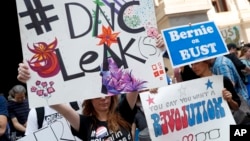Inside the secretive world of cybersecurity experts is a phrase that quickly determines the severity of a cyberattack: Is this mischief or calamity?
For the higher-ups at the Democratic National Committee, hit by a cyberattack that vacuumed up thousands of emails, which WikiLeaks then leaked, it sure felt like a calamity.
It was the night before the opening of the party convention, and the world had an up-close peek at the rough-and-tumble world of American politics: emails that showed party leaders were doing everything they could to ensure that former Secretary of State Hillary Clinton, not Vermont Senator Bernie Sanders, would win the party's nomination for president.
The hack was quickly laid at Russia’s doorstep, which prompted some mudslinging by Donald Trump, who had just become the Republican presidential candidate at his party's convention the week before. Trump grabbed headlines again when he called on Russia to find “the 30,000 missing emails” that Clinton's staff said they had deleted because they were purely personal.
The DNC tried to ignore the controversy, but just hours into day one of the convention, the party's national committee chairwoman, Debbie Wasserman Schultz, stepped down.
For cyber experts, this was small stuff … mischief. No one died. No sovereign nation was violated. No infrastructure destroyed. Cyberattacks happen all the time, all over the world. The DNC was embarrassed, but that’s nothing compared to a loss of life.
However, the connection with Russia hung around. Not because of Trump, but because of the implication that President Vladimir Putin was meddling in U.S. political affairs — a presidential election, no less.
President Barack Obama, hosting Prime Minister Lee Hsien Loong of Singapore at the White House, was asked how the alleged Russian connection to the DNC hack might impact America’s already strained relations with Putin.
“In terms of how it affects our relationship with Russia, look, I think we’ve already got a lot of differences with Russia on a whole bunch of issues," Obama said. “If, in fact, Russia engaged in this activity, it’s just one on a long list of issues that me and Mr. Putin talk about and that I’ve got a real problem with. And so I don’t think that it wildly swings what is a tough, difficult relationship that we have with Russia right now.”
He reiterated that the United States is ready to “impose potentially certain proportional penalties.” Obama gave no specifics, but said the FBI is still investigating.
That Russia was behind the DNC breach is widely accepted. Shocking as it may sound, China routinely hacks the United States and has done so successfully, said Fred Kaplan, a columnist for Slate.com and author of "Dark Territory: The Secret History of Cyber War."
“The distinction between China and Russia when it comes to cyber activities is that China is kind of indiscriminate about it," Kaplan said Wednesday, during a radio appearance (Stand Up! with Pete Dominick on SiriusXM). “Russia tends to be a bit cagier about it, and some of their hacks are much harder to trace. They’re subtler and they cover their tracks well.”
Scary? Yes, with scenarios of blacking out the power grids of entire countries swirling around one’s head.
Kaplan says the United States employs some of the world’s brightest cybersecurity experts at the National Security Agency, the most secret of all U.S. intelligence services.
Those who are in charge of U.S. cybersecurity are focused on three key aspects of cyberwarfare: deterrence, detection and resilience. And Kaplan’s well-placed sources tell him “we are the best at this.”
That's good to know.






